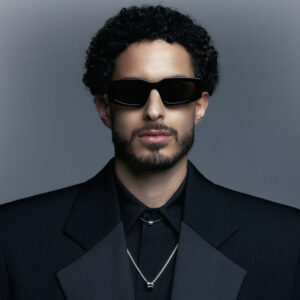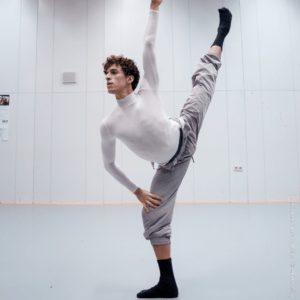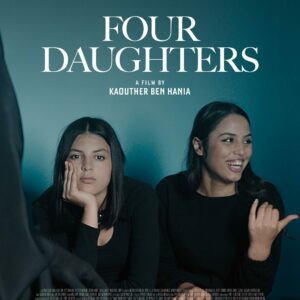In the heart of Gaza, a young voice rises above the rubble. This voice doesn’t just rap, it roars, it rebels and it reverberates. It belongs to Abdulrahman Al-Shantii, or as the world has come to know him, MC Abdul.
Growing up in his home in Gaza, where the walls bear the scars of conflict and time, the 15-year-old lyrical prodigy found solace in the rhythmic cadence of hip-hop – a stark contrast to the cacophony of violent sounds that filled the air outside his window, from the ear-splitting booms to the unsettling silence that follows.
Swimming in a sea of intricate lyricism and raw emotional depth, MC Abdul offers a poignant chronicle of Gaza’s collective experience and the often unfathomable challenges of living in Palestine under occupation. Going back to 1948, his family’s story is a complex mosaic of resilience, upheaval and displacement. His grandparents were compelled to seek refuge, their lives forever confined to the borders of Gaza.

Born in 2008, decades after his family’s initial plight, Abdul came into a world still marred by systemic injustices and a spectrum of desensitising experiences. By the time he was 13, he had already lived through four separate instances of warfare. His formative years were punctuated by the dissonant sounds of fighting, killing and the grim realities of life in occupied Palestine.
Yet, it was against this harsh backdrop that he sharpened his lyrical prowess. Displaying maturity well beyond his years, he turned to the written word as a vehicle to champion harmony, compassion and solidarity, even amidst the relentless violence and loss that coloured his world.
Instead of succumbing to the despair that enveloped his surroundings, he discovered a lifeline in music. “I became obsessed with developing this talent and passion that God blessed me with,” he confides, reflecting a wisdom that belies his years.
In a world that often turns a blind eye to the suffering of others, MC Abdul urges us to listen, and not just to his music, but to the cries of a generation yearning for peace. He may be young, but his words are timeless – his message universal. At just 15, he has already established himself as a seasoned lyricist of global significance, serving up verses that resonate deeply with their complexity and emotional weight.

Imagine this: an even younger Abdul, eyes wide and ears tuned, hears Eminem’s “Not Afraid” emanating from the speakers for the first time. The experience was, according to him, transformative, almost akin to a spiritual awakening. “At six years of age, I heard my first ever rap song,” Abdul remembers. “My father used to bump a lot of rock music and a little bit of hip-hop, but for me, I liked rap more. Even though I didn’t understand what the songs were talking about, I just loved them,” he candidly admits.
His foray into rap was far from a dalliance. It was a calculated pursuit informed by years of in-depth study of artists and lyrics that resonated with him. “I did my first mixtape after years of studying artists I could relate to and meaningful songs I could study and memorise to develop my skills,” he reveals. “When I became fluent in English, I just wanted to try it out for fun, and it turned out to be alright. I was like this isn’t so bad, and ever since then my passion for hip-hop grew.” This wasn’t a fleeting infatuation. It was the genesis of a lifelong passion.
That dedication eventually paid off—big time. At just 12 years old, the young rapper suddenly found himself in the spotlight, going viral on Instagram with his debut Single “Palestine,” a one minute and 30 seconds free verse, released amidst a surge of rising conflict in Sheikh Jarrah. Collaborating with Irish producer GMCBeats, he laid down impassioned verses detailing the atrocities occurring around him over the beat of Eminem’s 2002 classic, ‘Cleanin’ Out My Closet.’ The video racked up millions of views and thousands of comments from people all across the world within days.

The viral success caught the eye of US record label Empire, which promptly signed him. His first single under Empire, “Shouting at the Wall,” propelled him into unexpected fame, becoming an overnight sensation and amassing millions of views almost immediately. The video is a haunting walk through the rubble and ruins of Gaza, a backdrop that adds a visceral layer to his already potent and incisive lyrics.
With the advent of virality comes an inescapable sense of duty, something Abdul is acutely aware of. Yet, the sudden thrust into the limelight imbued him with a sense of gravitas. “Ever since I went viral, I felt the responsibility to go out and keep telling the world about the situation and the harsh reality we go through,” he acknowledges. “I feel I have the duty to go out while there is a war going on outside with no cease fire, so I can tell the world about the pain we go through and how we should never ever live like this.” He sees himself as a voice for his people, a conduit for their collective pain and aspirations.
Despite etching out a unique path for himself, Abdul remains deeply rooted in the collective struggle of his people and sees himself as a part of a larger narrative. “I am like any other Palestinian. We all go through hard times. Struggles are big parts of our lives as Palestinians,” his voice tinged with a sombre realism. “But despite the harsh realities we still love life, and we still have hopes for us to live in peace with freedom like the rest of the world.”

Abdul’s sonic footprint has already extended beyond the borders of his hometown. His journey took an international turn, when he appeared as part of the FIFA World Cup 2022 festivities. 13 years old at the time, he played his first-ever concert at Doha’s Oxygen Park, with a sharpshooting set featuring some of his most viral tracks.
Another pivotal moment was his debut performance in Lebanon earlier this year, a cherished experience that he recounts with gratitude. “First of all, I’m so happy I have experienced Lebanon for the first time,” he says. “Shout out to my Palestinian brother Saint Levant for bringing me out on his show. The stage, the studio, the booth—these are the places I feel like I belong to. The engagement was amazing, and I’m grateful I got on that stage.”
But Abdul is not just looking to conquer stages. He’s eyeing a bigger arena. A broader canvas. The next chapter in Abdul’s odyssey is laden with promise and complexity. “Moving to the USA is a really important move and step in my career,” he confides. “It’s all about learning. I’m going to improve my writing and keep talking about the social issues, the struggles, and the pain me and my people go through. But I also want to make music people can vibe to and have fun listening to.”

And that’s exactly what he did in his latest track “Killing the Game,” where he flexes not only his lyrical prowess but also his evolving thematic range. According to him, the track not only marks a new direction, but also serves as his personal manifesto. “Killing the Game is an important song to me,” Abdul says. “When I heard that beat, I felt a hype to it, and I felt like I wanted to rap about my skills, and how I’m killing the game, and how I am going to rise all the way, and no one will stop me from following my passion. I am going to shine and rise,” Abdul declares with an unyielding resolve.
MC Abdul compels us to not just hear, but to listen— to the nuanced verses, the layered beats, and the silent anguish of generations of Palestinians. His youth belies the profundity of his words, making him not just a rapper but something of a raconteur of his time, his verses echoing the collective heartbeat of a people yearning for liberation.
A young sage with a microphone, and a revolutionary in the making, his lyrics are his arsenal, his voice a clarion call, and his story a study of resilience, talent, and an indomitable will to rise above circumstances.
MC Abdul may be one voice, but he speaks for many.

For more stories and interviews like this one with MC Abdul, check out our dedicated music and arts & culture pages.












